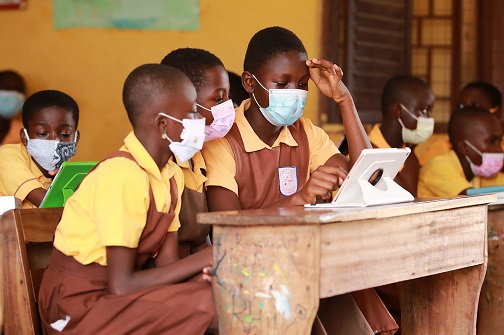
Million desks needed for public basic schools nationwide — Education think tank
Over one million desks are needed by public basic schools across the country to ensure effective teaching and learning, Africa Education Watch (Eduwatch), an educational consultant and think tank, has said.
Advertisement
That, it said, was because 2,330,893 basic school pupils did not have writing or seating places as of 2021.
Out of that number, it said, 596,949 were in Kindergarten, 1,308,479 were in Primary and 425,465 were in the Junior High School (JHS) and because the country operated a dual desk policy at the basic school level, over a million desks were needed to salvage the situation.
A Senior Programme Officer at Eduwatch, Divine Kpe, made this known during a presentation at the launch of the Global Action Week for Education (GAWE) by the Ghana National Education Campaign Coalition (GNECC) held in Accra.
It was chaired by the Executive Director of Ghana Blind Union (GBU), Dr Peter Obeng Asamoah.
The primary goal of the celebration was the promotion of the global Sustainable Development Goal four (SDG 4) which is to “ensure inclusive and equitable quality education and promote lifelong learning opportunities for all.”
According to Mr Kpe, the furniture deficit situation had occurred because of increased funding for secondary infrastructure compared to that of the basic level.
He also said available data had indicated that the huge desk deficit was one of the major factors that discouraged some parents from sending their children to school.
“The lack of desks in schools affects children’s academic performance and may cause children not to find the school environment friendly to remain in school putting them at the risk of droping out of school,” he added.
Way forward
Mr Kpe urged the media and civil society organisations (CSOs) to let the public and the government know the implications of the desk situation in basic schools for the attainment of SDG 4 so as to empower the citizens in the communities to demand action from local government to address the problem.
He called for increased funding for basic education infrastructure development by uncapping the GETFund and reviewing the formula for the allocation of the Capital Expenditure (CAPEX) to reflect the needs of basic education infrastructure.
Call on government
The vice chairman of GNECC, Joshua Nyumuah, said even though government was doing the best it could, more resources were needed to be channelled into the sub-sector to avoid an “educational accident.”
Education is not a privilege but rather a human right which has been enshrined in the SDG 4 for which GNECC is fighting then we have to use all the tools to lobby and advocate Ghana to do the needful,” Mr Nyumuah stressed.
There were solidarity messages from stakeholders in the education sector and partners of GNECC.
They were ActionAid, Oxfam, CAMFED, National Association of Graduate Teachers, Ghana National Association of Teachers, United Nations Educational, Scientific and Cultural Organisation, Ghana Education Service and the Complementary Education Agency.




